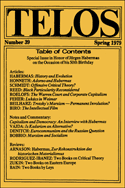As an occasional feature on TELOSscope, we highlight a past Telos article whose critical insights continue to illuminate our thinking and challenge our assumptions. Today, Matt Applegate looks at Yvette Biro’s “The Intellectual Film: Eisenstein’s Plan to Film Marx’s Capital“ from Telos 39 (Spring 1979).
 It is difficult to think of what cinema is in the present, and indeed, what cinema might be in the future, outside of large studio systems, box office opening numbers, and global profit intake. Even so-called “independent” films often circulate in a virtual minor league of the Hollywood studio system, vying for wide release. To be sure, cinema’s thorough commodification both limits its potential for aesthetic experimentation and makes it easier to equate it with other forms of media. When cinema becomes secondary to the metrics of profit, its distinct aesthetic qualities are subordinate to its function as a product comprised of moving images and sound. Moreover, as film moves away from celluloid and toward digital formats, one is compelled to ask what makes cinema distinct as visual technology is homogenized. This is not to say that cinematic experience and practice are bankrupt aesthetic qualities or that film is doomed to devolve into an indistinct mesh of CGI and user-generated websites like YouTube and Vine. Rather, as Yvette Biro suggests in her “The Intellectual Film: Eisenstein’s Plan to Film Marx’s Capital,” the horizon of cinematic thought and practice is perhaps best imagined by examining the relation between ideology and cinematic aesthetics.
It is difficult to think of what cinema is in the present, and indeed, what cinema might be in the future, outside of large studio systems, box office opening numbers, and global profit intake. Even so-called “independent” films often circulate in a virtual minor league of the Hollywood studio system, vying for wide release. To be sure, cinema’s thorough commodification both limits its potential for aesthetic experimentation and makes it easier to equate it with other forms of media. When cinema becomes secondary to the metrics of profit, its distinct aesthetic qualities are subordinate to its function as a product comprised of moving images and sound. Moreover, as film moves away from celluloid and toward digital formats, one is compelled to ask what makes cinema distinct as visual technology is homogenized. This is not to say that cinematic experience and practice are bankrupt aesthetic qualities or that film is doomed to devolve into an indistinct mesh of CGI and user-generated websites like YouTube and Vine. Rather, as Yvette Biro suggests in her “The Intellectual Film: Eisenstein’s Plan to Film Marx’s Capital,” the horizon of cinematic thought and practice is perhaps best imagined by examining the relation between ideology and cinematic aesthetics.







